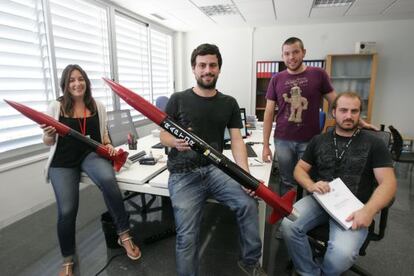Rocket science on a shoestring
Students secure 800,000 euros in funding for a space research mission

If someone had told 26-year-old Raúl Torres that while other people of his generation were packing up their things to seek jobs abroad, he and a couple of friends would secure 800,000 euros in funding to make his childhood dream a reality, he would have laughed in their face. And what a dream it is: building a rocket without moving from his native Elche, a town in Alicante province famous for its palm groves and the Lady of Elche Iberian statue from the fourth century BC.
Within the next four years, Raúl Torres, his namesake Raúl Verdú and another partner, José Enrique Martínez, are planning to launch a rocket to a distance of over 250 kilometers above the Earth's surface. The suppository-shaped device will be filled with 200 kilograms' worth of scientific experiments and will be 13 meters long and 0.65 meters wide, with a weight of around 2,000 kilograms. This, at least, is the initial idea that they're working with at Payload Aerospace, inside the science and business park of Miguel Hernández University in Elche.
"One day, I talked the project over with Raúl," explains Torres, a biology graduate who got as far as the third year of aeronautic engineering before embarking on this project. "Why is it that, if electronics keep getting smaller, telecoms satellites cannot get smaller, too? They generally weigh between five and 10 tons, but these days there is a segment of the market that builds satellites of one to 100 kilos. You don't need such huge rockets to get them into outer space. That's when we thought: there's a market out there."
There are only two companies in Europe who do what Payload Aerospace is planning to do. It's not that NASA's future is at stake, but folks from Elche like to think of themselves as people with an entrepreneurial spirit, and above all, as courageous. The Raúls certainly are both things. Their parents (one mother has been unemployed since 2008, the other sews shoes at home; one father is a plumber without too many projects on his hands, while the other is a machine operator at a cardboard factory) loaned them the money to sign up as self-employed workers and apply for government grants.
"We had to pay a consulting firm, a ministry auditor firm, we traveled to Madrid around a thousand times to justify the project, and even to Naples to explain it to the European Space Agency. We're not rich kids," adds Torres. There is a note of pride in his voice when he talks about a project that sounds quite alien in Spain but which gained traction after winning a competition at Valencia's Polytechnic University in 2010.
The rocket will be developed in several phases. Phase One, which is starting now, involves building the engines, which will be tested six months from now at a trial facility under construction at the nearby location of Las Salinas. Phase Two will enlist two other companies, one from Elche and another from Valencia, to build the actual rocket.
"What the ministry liked is that with just a few tweaks it could be placed in orbit. We didn't receive a single grant - we're doing this on loans that will be repaid with results," says Torres. Public investment was 250,000 euros, private investors contributed 300,000 euros, and La Caixa bank provided a 100,000-euro loan. "And this week or the next the Valencian Finance Institute will approve another 200,000-euro credit line."
"Up until a few days ago we were coworking, sharing a desk and an office with other companies," he adds. "Nobody tells you how to build a rocket, but you have to start somewhere."
"We will launch it from the military base of Arenosillo, in Huelva," explains Torres, noting in an amused tone that "it's not Cape Canaveral, but they were already launching rockets from there in the 1960s."
And so, at age 26, with nearly 800,000 euros in their pockets, and in the midst of the worst credit crunch since the days of Isabel II in the 19th century, these three have already hired four employees and three interns.
Tu suscripción se está usando en otro dispositivo
¿Quieres añadir otro usuario a tu suscripción?
Si continúas leyendo en este dispositivo, no se podrá leer en el otro.
FlechaTu suscripción se está usando en otro dispositivo y solo puedes acceder a EL PAÍS desde un dispositivo a la vez.
Si quieres compartir tu cuenta, cambia tu suscripción a la modalidad Premium, así podrás añadir otro usuario. Cada uno accederá con su propia cuenta de email, lo que os permitirá personalizar vuestra experiencia en EL PAÍS.
¿Tienes una suscripción de empresa? Accede aquí para contratar más cuentas.
En el caso de no saber quién está usando tu cuenta, te recomendamos cambiar tu contraseña aquí.
Si decides continuar compartiendo tu cuenta, este mensaje se mostrará en tu dispositivo y en el de la otra persona que está usando tu cuenta de forma indefinida, afectando a tu experiencia de lectura. Puedes consultar aquí los términos y condiciones de la suscripción digital.








































